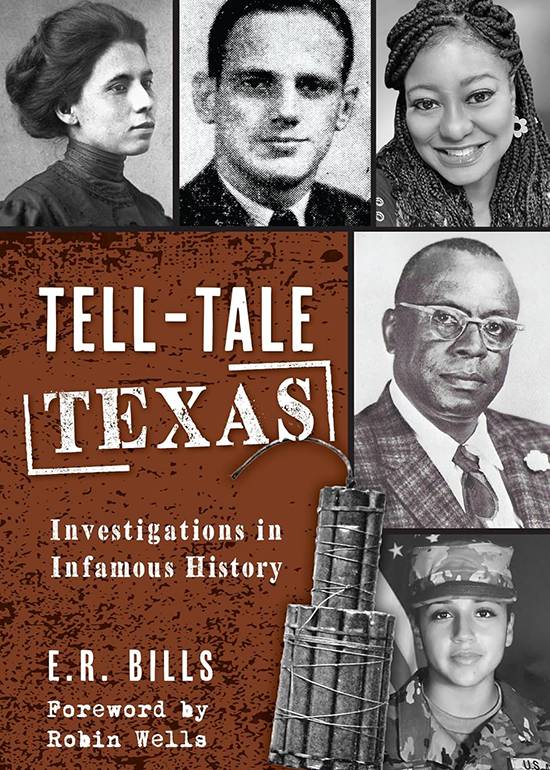Absent But Not Forgotten Texas History

Tell-Tale Texas: Investigation into Infamous History
by E. R. Bills
Charleston, SC: The History Press, 2023.
176pp. $21.32 Paperback.
Reviewed by
Jay Cody Key
There is a veneer of infallible greatness surrounding Texas for many who live in the Lone Star State. These people would not appreciate the work done by E. R. Bills to uncover the “infamous history” of Texas that has been hidden from those who do not study the state’s history in depth. Texas history is more than just the Alamo, cowboys, and Texas Rangers allegedly saving the day. Texas history also includes the systematic oppression of minorities in the state and justice turning a blind eye to those who need it most time and time again. As Bills claims, “We should no longer avert our eyes to what went on. This is who we were and, in some sense, still are. Our ignorance is indefensible and asinine in ways that should never stop offending us.”
The book is organized into vignettes of incidents that Bills has investigated either specifically for this book or as supplemental information from previous articles or books that he has written. The most common theme throughout the chapters is that Black and Hispanic victims of racially motivated murders were regularly denied justice, although Bills also looks into the ways in which Texas oil, specifically Texaco, supported the fascists in the Spanish Civil War alongside Mussolini and Hitler, as well as the epidemic of military suicide happening in Ft. Cavazos to this day.
The writing of the book is equal parts informative for the specific topic being discussed as well as the methods Bills used to research the incidents he covered. He goes on at length recounting interviews he did with family members of victims, struggling to find documentation of the nefarious incidents, and constant roadblocks from governmental bodies he faced trying to establish memorial sites at locations where minorities were lynched for crimes they were not found guilty of. The inclusion of Bills’s difficulties in researching aspects of Texas history that have been systematically covered up and hidden gave his writing a deeply personal feeling, especially to those who attempt to study Texas history beyond the facade of what is traditionally taught in schools. While all of the chapters are as fascinating as they are haunting, there are several that stand out as particularly chilling.
The first chapter examines the alleged suicide of Frank J. Robinson in the town of Palestine, Texas. Robinson was a civil rights leader in Texas who fought gerrymandering and organized the Black and brown community to petition for their rights. On October 13, 1976, Robinson was found dead in his garage after suffering a single shotgun shot to the head. The ensuing investigation suggested that Robinson was murdered; no gunpowder residue was found on his body, and there were clear signs of multiple shots being fired at the crime scene. The investigation turned up no suspects, and eventually the case was ruled a suicide. Bills recounts interviews with law enforcement, politicians, and local records that clearly point to foul play; in fact, Bills claimed that none of the people of Palestine he talked to believed that it was a suicide. A political assassination occurred in Texas, cutting short the life of one of the most prominent civil rights leaders in the state, and no one was held accountable.
A similar lack of justice is covered in the last chapter where Bills revisits the Slocum Massacre, a topic he had previously published a book and an article on. From July 27, 1910, through July 29, 1910, white citizens of Slocum rampaged through the town rounding up Black citizens and murdering them with wanton disregard for the lives they were taking. The ethnic murders were motivated by an unfounded fear of a Black uprising in the town. It was likely due to the fact that the Black community had begun establishing a foothold in the local economy and in the fallout of the Texan Black boxer, Jack Johnson, defeating the “The Great White Hope” Jim Jeffries for the heavyweight title, many white residents claimed that the sense of pride the victory instilled in the Black community was constituting “uppity” behavior. The aftermath of the massacre left countless people dead, with many bodies unclaimed as the murderers chased people fleeing into the woods for cover. The properties of the deceased were purchased by the whites of the town and for the white mobs, life continued as normal, no repercussions befell them.
These two chapters from the book were among the most infamous of the incidents Bills covered, but even still they are not well known to most Texans. Every chapter calls into question the fabricated glory of Texas history, revealing a seedy underbelly full of racism and manufactured status among the Texan elites and common white citizens. As Bills puts it, victors of history do not simply write the history of events in Texas, they also “white” that history. That statement, along with the impressive research done by Bills highlights the need for more work to be done in understanding the truth of Texas history for so many of the non-white citizens to understand that not everything has been or nor continues to be “alright, alright, alright” in the Lone Star State. Revealing events from as far back as the Civil War all the way until the current day, Bills reveals the infamous history of Texas.
Jay Cody Key grew up in San Antonio before moving to San Marcos for his undergraduate degree in history. He is currently a graduate student at Texas State University researching Lebanese immigration to San Antonio, Texas, for his thesis. The majority of his graduate studies focus on the Southwest borderlands as well as Texas history and Mexican American history.
